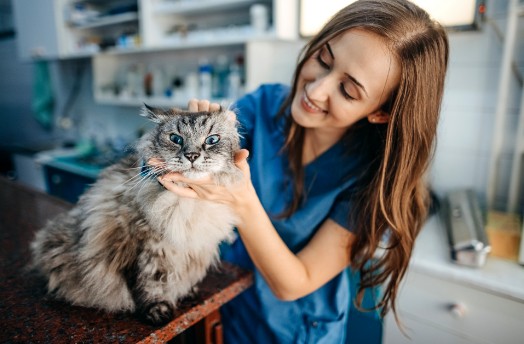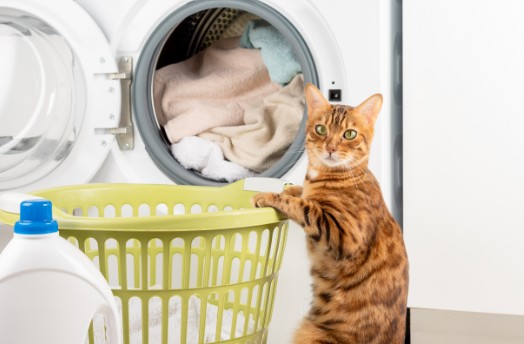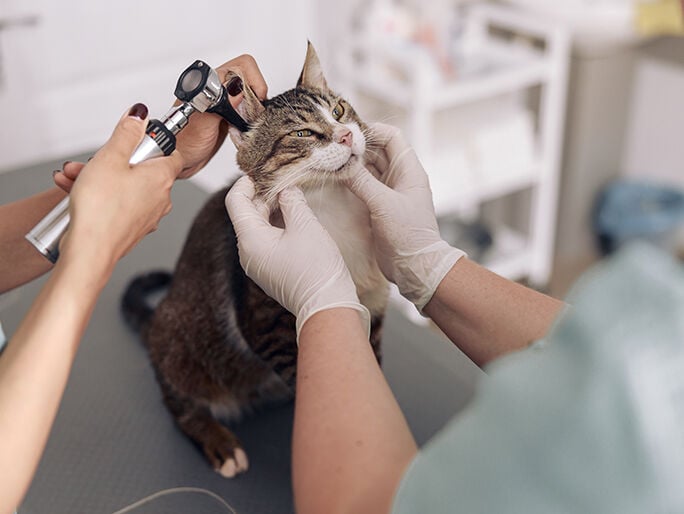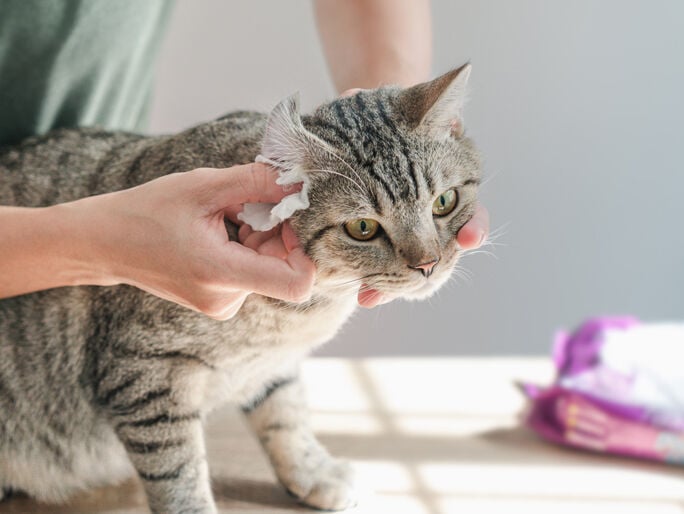ear mites in cats
Coffee-ground-like buildup in cat ears could mean an ear mite infestation.
Ear scratching from untreated mites can lead to painful ear infections in cats. Here’s what to do and know.
Ear mite symptoms in cats
- Black or brown gunk in ears
- Constant ear scratching
- Ear scabs and hair loss
- Head shaking
- Ear sensitivity and pain
- Aural hematomas (swollen, blood-filled ear flaps)

How to help prevent ear mite infestations
- Use prescription ear mite prevention
- Regularly check pet ears
- Separate infected pets
- Regularly wash toys and bedding
- If you spot symptoms, see the vet
How to tell if your cat has ear mites
Ear mites can easily spread between pets. Here’s what to do and know about fighting mites.

Spotting black, gray, or brown gunk inside your cat’s ears? It could be a goopy mixture of dead ear mites (Otodectes cynotis) and ear wax.
Live mites are difficult to spot with your naked eye because each tiny spider-like mite is no bigger than a pinhead. Adult ear mites live inside your cat’s ear canal, munching on skin debris and ear wax.
While each mite doesn’t live long, a female mite can lay up to five eggs a day, so it doesn’t take long to create an entire colony in your cat’s ear canals. This creates a deep, itchy irritation that can drive your cat absolutely bonkers and lead to the goop you may see in their ears.
In addition to the telltale gunk inside their ears, common ear mite symptoms also include ear sensitivity and constant ear scratching that can cause baldness and sores around the ears. You may also spot aural hematomas, which means the ear flaps become swollen and full of blood from scratching.
Is it ear mites or an ear infection?
Ear mites and infections are two different health issues that share some common symptoms: weird ear discharge, shaking their head, and pawing at their ears. Cats can also have both ear mites and an ear infection at the same time.
Although they both affect ears, ear mites and ear infections need different kinds of medication to help your cat. Ear infections often require antibacterial or antifungal treatment that is chemically different from the meds used to kill ear mites.
Ears are both delicate and complex! We always recommend you skip self-diagnosing your cat’s ear issues and see your vet.
How cats catch ear mites
Mites spread easily from cat to cat — or from cat to dog and vice versa — through direct touch or a favorite blanket or toy. Outdoor cats may pick up mites from other cats or environments. Indoor cats in multi-cat households can easily infect each other (kittens are especially at risk).
If your pet is diagnosed with ear mites, we recommend trying to separate them from other pets until their mite treatment is 100% complete. Deep-cleaning all toys and bedding during treatment can also help prevent spreading mites or causing reinfection.
However, ear mites are so contagious that if one pet in your household has mites, it’s a good bet that — even with the best precautions — the rest of them will get mites too. Your veterinary team can help with an action plan to help diagnose and treat all the affected pets in your household.
How to treat ear mites in cats
Itching from ear mites is a gateway to bigger ear issues like ear infections, which can lead to hearing and balance problems in cats.
Can you treat cat ear mites at home without a vet?
Cat ears are delicate and complex! Even with the best intentions, it’s entirely possible you could be “treating” the wrong thing while the real issue continues to affect your cat.
Unfortunately for do-it-at-home diagnostics, trying to treat ear issues on your own may end up backfiring on your cat. For example, if your cat has a ruptured ear drum, you risk causing even more damage (and pain) by putting anything in their ear.
Your veterinary team is your best resource for diagnosing and helping to treat ear mites (as well as any ear infections your cat may have). Please — never put anything into your cat’s ears unless directed by your vet.

What can the vet do for ear mites?
First off, we’ll ask you to give us as much background as you can. Let us know when you first noticed symptoms, any other weird behavior, and if you have other pets that may be at risk for carrying mites.
Then we’ll give your cat a physical exam, including looking at the inside of your cat’s ears with an instrument called an otoscope. Because we can’t always see little living mites even with help, we’ll also take a sample of ear discharge to examine under a microscope for mites, yeast, and bacteria.
Once we know what’s up, we’ll work with you on treatments and prescribe the appropriate medications to try and help your cat.
If the issue is mites, we’ll typically recommend both an ear cleaning solution and a topical parasiticide to kill the mites. We’ll also give you step-by-step instructions: first on how to clean kitty ears so the meds can get to the source, and then how to apply the mite meds.
Don’t hesitate to ask for any and all tips. We may even perform the first cleaning and medicine application right there at your visit.
Follow all veterinary and medical instructions carefully. We’ll need a follow-up appointment in about two to three weeks to confirm that the mite fight has been won.
Help prevent ear mites for cats
Want to help your cat avoid ear mites? Try these tips:
- Ask your veterinary team about regular parasite prevention for your cats that includes protection against mites.
- Regularly wash cat toys and bedding.
- Get comfortable looking at your cat’s ears. If you spot black or brown gunk, if your furry pal is suddenly shaking their head, or if they’re pawing or scratching at their ears, your veterinary team is here to help.

Mentioned in this article

Does your cat have an ear infection?
Know the symptoms of ear issues in cats.

How to clean cat ears
A step-by-step guide to help you and your cat.

Treating dog ear infections without a vet
What to know about popular home remedies.

Need advice on flea control? Ping Pet Chat™!
Whether it's 3 a.m. or 3 p.m., connect with a real veterinary professional for immediate petcare advice. It's included in all Optimum Wellness Plans®!
Log in to start chattingHow Banfield can help with ear care for cats and dogs
We take happy, healthy pet ears seriously! Our vets can help you find out what’s causing your pet’s ear issues, work with you on a treatment plan, and prescribe safe and effective medications to help treat your pet. We can even work with you to help prevent future problems.

We can work with you to help manage chronic ear infections. If you notice your pet is getting ear infection after ear infection, let’s discuss underlying causes, solutions, and possible prevention for your pet’s issues.
We can provide guidance for cleaning and medicating dog and cat ears. Infected ears can be tender, which may make it rough to treat them at home. Let us know if your pet absolutely refuses to cooperate — we’re here to help!
We can help identify and manage food or environmental allergies that can cause ear infections and skin itchiness and irritation. If you suspect an allergy is causing your pet to sneeze, wheeze, itch, or scratch, we’re here with professional guidance to help your pet.
Any other health concerns?
Just let us know. We’re here to help with loving veterinary care, including your pet’s adorable ears.
 Mites and mange
Mites and mange Podcast - Not Just Fluff
Podcast - Not Just Fluff



